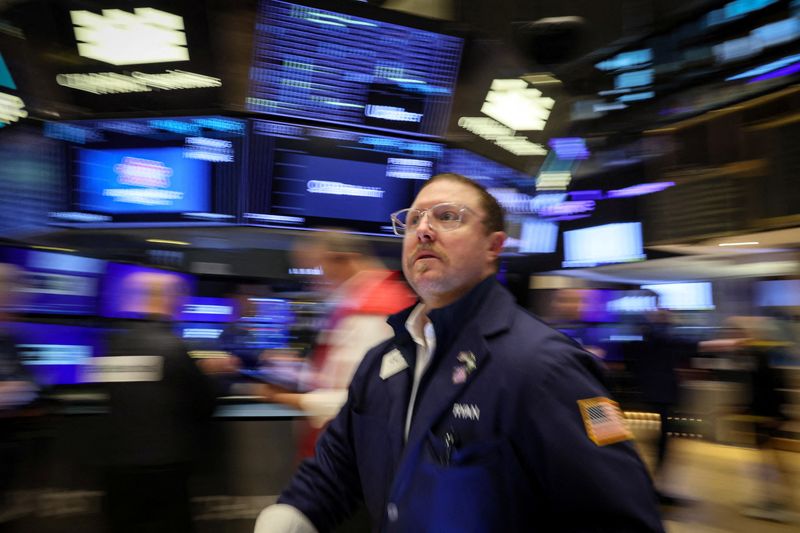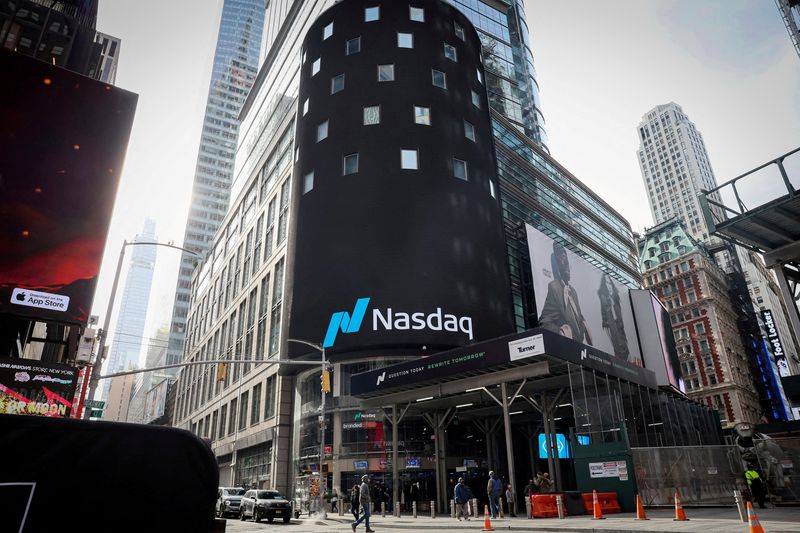By David French
(Reuters) -The S&P 500 and Nasdaq ended at multi-week lows on Wednesday, with the S&P snapping one of its longest streaks without a daily decline of more than 2%, as lackluster Alphabet (NASDAQ:GOOGL) and Tesla (NASDAQ:TSLA) earnings undermined investor confidence in megacap names.
As the first of the Magnificent Seven stocks reported quarterly numbers, investors had been awaiting new data to see if lofty valuations were justified. With these seven companies having such sway over markets, their performance was bound to have wide repercussions.
Investor reactions to the numbers contributed to the benchmark S&P 500 posting its worst one-day performance since December 2022. Its 2.3% fall marked the first time it had closed more than 2% off in 356 sessions, its longest streak since 2007.
The Nasdaq Composite was also beaten down, posting its largest single-day percentage decline since October 2022 to finish at its lowest point since June 10. Meanwhile, the Dow Jones Industrial Average closed below 40,000 points for the first time in two weeks.
Dave Grecsek, managing director in investment strategy and research at Aspiriant, noted that the upward momentum of the first two weeks of July in equity markets had now disappeared over the last week.
"There's a little bit of profit-taking, and then people are a little apprehensive about earnings announcements upcoming," he said.
Tesla weighed heavily on Wednesday, slumping 12.3% in its worst single-day fall since September 2020. This came after the electric-vehicle maker reported its lowest profit margin in more than five years and missed second-quarter earnings estimates.
Google parent Alphabet dropped 5%, to its worst finish since May 31, despite a second-quarter earnings beat, as investors focused on an advertising-growth slowdown and the company flagged high capital expenses for the year.
Tesla and Alphabet dragged the S&P 500 Communication Services and Consumer Discretionary sector indexes down by 3.8% and 3.9% respectively, with the Consumer Discretionary index posting its largest single-day decline since September 2022. Information Technology was the weakest performer of the 11 S&P sectors though, and its 4.1% decline was its largest daily drop since October 2022.
Alphabet's losses underscored the high earnings bar for the so-called Magnificent Seven, a set of megacap tech stocks that have notched double- and triple-digit percentage gains in 2024, riding on optimism around AI adoption and expectations of an early start to the Federal Reserve's interest-rate cuts.
"When you put everything in an earnings context, you can really understand why those Mag 7 stocks have been performing so great because the earnings have been there," said Grecsek.
Any doubts, however, about the stocks meeting expectations will induce selling pressure. The other megacaps, Apple (NASDAQ:AAPL), Microsoft (NASDAQ:MSFT), Amazon.com (NASDAQ:AMZN), Meta (NASDAQ:META) Platforms and Nvidia (NASDAQ:NVDA), all closed down between 2.9% and 6.8%.
Meanwhile, the blue-chip Dow did not escape the negativity. Visa (NYSE:V) was among the stocks that weighed on it, dropping 4% after its third-quarter revenue growth fell short of expectations.
As stocks tumbled, the Cboe Volatility Index - known as Wall Street's fear gauge - closed at 18.04, the highest since April 19.
The S&P 500 lost 128.61 points, or 2.31%, to 5,427.13 points, while the Nasdaq lost 654.94 points, or 3.64%, to 17,342.41. The Dow Jones Industrial Average fell 504.22 points, or 1.25%, to 39,853.87.
Among others, AT&T (NYSE:T) gained 5.2% after beating forecasts for wireless subscriber additions, while solar inverter maker Enphase Energy jumped 12.8% after reporting a second-quarter operating profit beat.

Meanwhile, Roper Technologies (NASDAQ:ROP) dropped 7.4% after it signaled third-quarter profit would fall below estimates. Boston Scientific (NYSE:BSX) traded 1.1% down, despite lifting its 2024 profit target and beating second-quarter earnings estimates.
Volume on U.S. exchanges was 12.94 billion shares, compared with the 11.48-billion average for the full session over the last 20 trading days.
